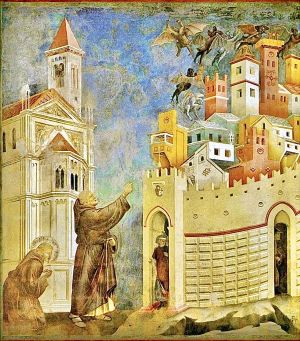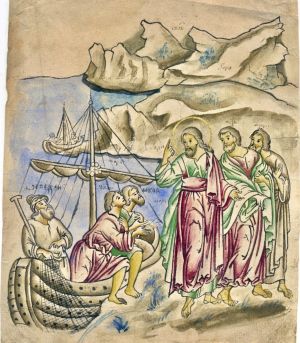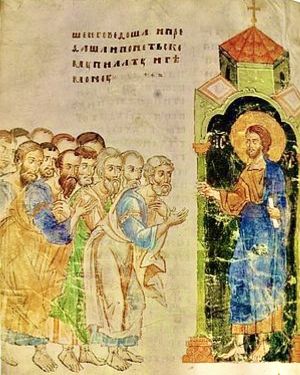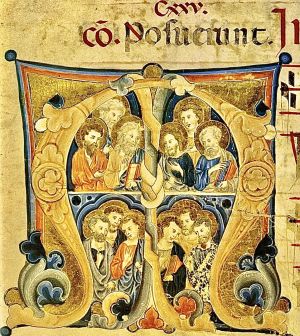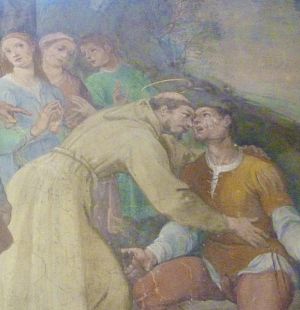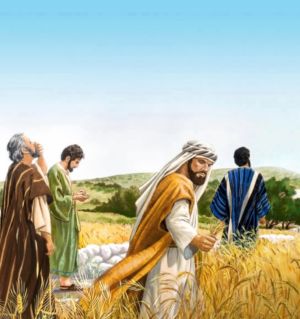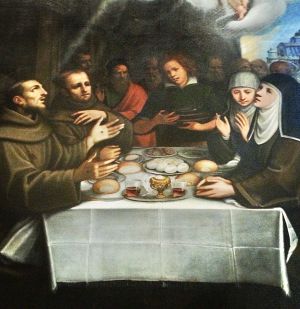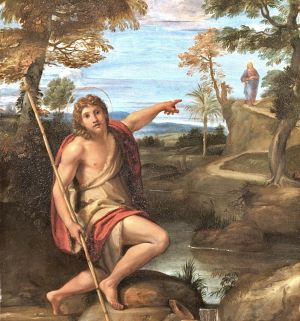
Teresa Girolami
Teresa Girolami è laureata in Materie letterarie e Teologia. Ha pubblicato vari testi, fra cui: "Pellegrinaggio del cuore" (Ed. Piemme); "I Fiammiferi di Maria - La Madre di Dio in prosa e poesia"; "Tenerezza Scalza - Natura di donna"; co-autrice di "Dialogo e Solstizio".
«If a kingdom is divided against itself, that kingdom cannot stand»
The evangelist Mark pays attention to the blasphemous statement of the scribes who see in Jesus a man possessed by Beelzebubl, prince of demons. But the Lord displaces them with unassailable answers.
The 'jester of God', precisely because he loved Him, was much persecuted and had strenuous struggles with those who point their fingers at God day and night against their brothers.
The Sources tell of various circumstances in which the servant of God had to suffer for his sake, defending himself with continuous and profound prayer, which transferred the Holy Spirit into his soul.
"He arrived one day in Arezzo, while the whole city was shaken by civil war and threatened with imminent ruin. The servant of God was lodged in the village outside the city, and saw over it exultant demons, who were stirring up the citizens to destroy each other. He called Brother Sylvester, a man of God and remarkable simplicity, and commanded him:
"Go to the gate of the city, and by Almighty God command the demons that as soon as possible they leave the city".
The pious and simple friar hastened to obey, and after addressing God with a hymn of praise, he cried out before the gate in a loud voice:
"From God and by order of our father Francis, go away from here, all you demons!".
The city soon afterwards found peace and the citizens respected each other's civil rights with great tranquillity.
Later, speaking to them, Francis, at the beginning of his preaching, said:
"I speak to you as people once subjugated and enslaved by demons. But I know that you have been set free through the prayers of a poor man'" (FF 695).
«If a kingdom is divided against itself, that kingdom cannot stand» (Mk 3:24).
Clare of Assisi also had to fight several times.
In the Legend we find:
"Between the Hours of the Day, at the Sixth and at the Ninth, she is usually seized with greater compunction, wanting to immolate herself with the immolated Lord.
So it happened once that, while she was praying in her little cell at the Ninth Hour, the devil struck her on the jaw and bloodshot one of her eyes, and he gilded one of her cheeks" (FF 3215).
These two great witnesses of the faith knew that evil is envious of the Good, but also that the latter takes ground from it inch by inch, since darkness cannot prevail over the Light.
Monday 3rd wk. in O.T. (Mk 3:22-30)
Jesus is Light in his preaching, and walking along the Sea of Galilee, he draws the sons of Zebedee to follow him, as well as Simon and Andrew, the fishermen.
Francis understood that the words of the Crucifix of San Damiano did not refer to the reconstruction of the small temple, but to the renewal of the Church in its members.
He had laid aside his penitential garments to take on the 'minorite' habit, girding his loins with a rough rope and covering his head with the hood worn by the peasants of the time, walking barefoot.
He had begun his apostolic mission by marrying Lady Poverty to become, as Jesus suggested, a fisher of men in the faith.
The Sources, in a transversal way, provide significant snapshots of this becoming a 'fisherman' in the proclamation of the Word of salvation.
In fact, we read in his address to the friars:
«Dear brothers, let us consider our vocation. God, in his mercy, has called us not only for our own salvation, but also for that of many others.
Let us therefore go throughout the world, exhorting everyone, by example rather than words, to do penance for their sins and to remember God's commandments».
He continued:
«Do not be afraid of being considered insignificant or unbalanced, but proclaim penance with courage and simplicity. Trust in the Lord, who has conquered the world!» (FF 1440).
Francis had cast his nets into the sea of society at that time to bring souls to God, and he taught his friars to do the same.
The latter "walked joyfully, speaking among themselves the words of the Lord, saying nothing that did not serve the praise and glory of God and the profit of the soul.
They frequently gave themselves over to prayer. The Lord took care of preparing hospitality for them and ensured that they were served with what was necessary" (FF 1455).
Amazement accompanied them, in their purity of spirit, for the souls they led to God - happy that the unloved Love (as Francis said) was becoming better known through the Proclamation.
And again in the Sources:
"Many people, seeing the friars serene in tribulations, cheerful and devoted in prayer, having neither money nor receiving money, cultivating brotherly love among themselves, from which it was recognised that they were truly disciples of the Lord, were impressed and sorry, and came to them and asked forgiveness for the offences they had committed.
They forgave them wholeheartedly, saying, «May the Lord forgive you!» - and gave them useful advice for their salvation.
Some begged to be received into their group [...] so they took with them some aspirants to the religious life and, in their company, they all returned, at the appointed time, to Santa Maria della Porziuncola" (FF 1445).
Because those who choose God have their choice imprinted on their hearts and faces.
«Come after me, and I will make you fishers of men» (Mt 4:19)
3.a Domenica T.O. (A) (Mt 4,12-23)
The evangelist Mk portrays Jesus surrounded by crowds, so much so that he had no time even for himself. And his own go to pick him up, considering him "out of his mind".
Francis of Assisi was often considered 'the fool' of Christ.
His living the Gospel 'sine glossa' was incomprehensible to many.
On the other hand, he himself considered himself crazy for the Lord.
"Many made fun of him, persuaded that he had given them the run-around; others were pitied to the point of tears, seeing that young man pass so quickly from a life of pleasures and whims to an existence transfigured by the intoxication of divine love.
But he, heedless of ridicule, gave fervent thanks to God.
How much he struggled in those restorations would be long and difficult to recount.
Used to every delicacy in his father's house, here he was now carrying stones on his shoulders, suffering many sacrifices to serve God" (FF 1421).
The spirit of prophecy shone in Francis, but when he exposed himself, it happened that he was taken for a fool, because the wisdom of the poor was despised, while the heart of the righteous proclaimed true things.
"When the Christian army was besieging Damiata, the man of God was also there, armed not with weapons but with faith.
The 'day of battle' came when the Christians had decided to storm the city.
When he heard this decision, the servant of Christ, coming out in loud laments, said to his companion:
"If the assault is attempted, the Lord has revealed to me that it will not go well for the Christians. But if I say this, they will think me a fool; if I keep silent, I cannot escape the reproach of conscience. So: what seems best to you?"
His companion answered him: "Brother, do not worry at all about people's judgement: it is not the first time you have been judged mad. Free your conscience and fear God more than men".
At these words, the herald of Christ confronts the crusaders, full of impetus, and, concerned to save himself from danger, tries to prevent the attack, foretells defeat.
But the truth is taken for a fable: they hardened their hearts and would not convert [...].
The ranks of Christians returned decimated by a terrible slaughter: about six thousand dead and prisoners' (FF 1190).
«And he came to the House; and again the crowd gathered, so that they could not even eat bread. And when they had heard, they [those around him] went out to get him, because they said: He is outside himself» (Mk 3:20-21)
Saturday 2nd wk. in O.T. (Mk 3,20-21)
Mk depicts Jesus ascending the mountain and in solitude-prayer calling the Twelve to follow him.
Francis' vocation to follow Christ was a call and attraction of other sequels. His assiduous prayer encouraged many souls to share the evangelical ideal.
Francis desired to have brothers who would «stay with him and to send them out to preach» (Mk 3:14).
In the Sources there are numerous episodes that portray the call of many future brothers and souls willing to follow Clare of Assisi.
We read:
"Some began to feel called to penance by his example and to join him, in habit and life, leaving everything behind.
The first of them was the "venerable Bernard", who, having been made a partaker of the divine vocation, deserved to be the firstborn of the blessed father, first in time and holiness.
Bernard, having ascertained by himself the holiness of Christ's servant, decided to follow his example, abandoning the world completely.
Therefore he turned to him, to know how to realise this intention" (FF 1053).
And to his brothers, he often repeated:
«This is our vocation: to heal wounds, to bind up fractures, to call the lost back.
Many, who seem to us to be members of the devil, may one day become disciples of Christ» (FF1470).
In the legend of St Clare:
"Placing her nest, like a silver dove, in the hollows of this cliff, she generated a host of virgins of Christ, founded a holy monastery and started the Order of the Poor Ladies" (FF3176).
"The fame of the sanctity of the virgin Clare soon spread through the neighbouring districts, and women flocked from all sides after the fragrance of her perfume.
The virgins, following her example, hasten to keep themselves as such for Christ; the married ones study to live more chastely [...].
Countless virgins, spurred on by the fame of Clare, having some impediment to embrace the cloistered life in a monastery, study to live in their father's house, though without a rule, according to the spirit of the rule.
Such were the seeds of salvation born by the example of the virgin Clare, that it seemed to be fulfilled in her the saying of the prophet: more numerous are the sons of the abandoned than of the one who has a husband" (FF 3177).
«And he went up on the mountain and called those whom he wanted, and they came to him» (Mk 3:13)
Friday, 2nd wk. in O.T. (Mk 3,13-19)
In today's Gospel Jesus, surrounded by a large crowd, heals many, and the unclean spirits call him by his Name: "You are the Son of God".
(Mk 3:11).
The Sources tell us that Francis, in his Letter to the whole Order, expresses himself thus:
«Brother Francis, a small and frail man, your little servant, wishes health in Him who has redeemed us and washed us in His most precious blood.
Hearing His name, adore Him with fear and reverence, leaning towards the earth: Lord Jesus Christ, Son of the Most High is His name, blessed for ever» (FF 215).
The Poverello always presents Jesus as the One who has nowhere to stand. In fact, even in today's passage, Christ, because of the crowd, asks the disciples to keep a boat ready for him so that he will not be crushed.
Jesus shows the precarious dimension of his living in all circumstances.
In love with poverty, Francis addresses his brothers with the expression from the Gospel:
«The foxes have their dens and the birds of the air have their nests; but the Son of Man has nowhere to lay his head [...]».
"[Thus] he taught the brothers to build poor huts [...] to live in them not as their own houses, but as in the houses of others, as pilgrims and strangers.
He said that the code of pilgrims is this:
«To gather under the roofs of others, to thirst for the homeland, to pass away in peace»" (FF1120).
And since he repeated that children of God are those who do his works, the Minim of Assisi distinguished himself as a child of God, and in the Spirit he performed many healings.
"People of all ages and sexes ran to see and hear that new man, given from heaven to the world.
He pilgrimaged through the various regions, fervently proclaiming the Gospel; and the Lord cooperated, confirming the Word with the miracles that accompanied it.
Indeed, in the name of the Lord, Francis, preacher of the truth, drove out demons, healed the sick, and, an even greater miracle, by the efficacy of his word he softened and moved the obstinate to penance and, at the same time, restored health to bodies and hearts" (FF 1212).
«For he cured many so that they rushed to him to touch him, as many as had infirmities» (Mk 3:10)
Thursday, 2nd wk. in O.T. (Mk 3:7-12)
Today's Gospel highlights the hardness of heart of the Pharisees who were ready to accuse Jesus for healing a paralysed hand.
For them, observance comes before the person. And that is terrifying!
Francis, the Little One of Assisi, on the other hand, in the footsteps of Christ, put human health, both physical and inner, at the centre.
For him, the brother (or sister) to be healed came before all criteria.
Announcing salvation and implementing it was the first reason that governs the universe, and for this he was ready for anything.
In the Sources we find life stories that draw attention to Francis' compassion for those waiting to be healed.
"A little girl from Gubbio with shrunken hands had already lost the use of all her limbs for a year. The nurse, confident that she would be cured, took her to the tomb of St Francis, bringing with her a wax figure the size of the child*.
After eight days of waiting, the miracle comes true: the little infirm girl recovers the use of her limbs, so that she is deemed fit for her former chores" (FF 549).
"A woman from the town of Gubbio had both her hands shrunken and dry, so that she could not use them at all. As soon as the Saint made the sign of the cross to her in the name of the Lord, she was so perfectly healed that she immediately returned home and began to prepare food with her own hands, as Simon's mother-in-law once did, in the service of Francis and the poor" (FF 1217).
But the Saint, as mentioned above, was struck by the hardness of heart shown by some Romans, before the preaching of the Word.
In the Testimonies following the death of Francis
"But the Roman people [...] covered him with contempt, to such an extent that they not only did not want to listen to him, but also deserted his sermons. And for many days they continued to mock his preaching. Then Francis rebuked them for the hardness of their hearts, saying:
«I greatly pity you for your misery, because not only do you hold me, the Lord's servant, in contempt, but in me you bring shame on that Redeemer whose good news I proclaim to you [...]
I will go and proclaim Christ to the brute animals and to the birds of the air; they will hear these words of salvation and will obey God with all their hearts» (FF 2288).
* It was a fairly widespread devotional form in the Middle Ages, that of offering, as an ex voto, to obtain a grace, figures of wax, bread, metal, of the same weight or size as the supplicant.
Wednesday 2nd wk. in O.T. (Mk 3,1-6)
The Sabbath was made for man and not man for the Sabbath, says the Lord. The priority is the person, not the law, which must be respected.
In Francis of Assisi, this truth is the basis of his path, the guiding motif of his exquisite actions.
Free from legalistic fetters, yet still in active obedience to the Word, in the face of the needs of the creature he was capable of going beyond appearances in his own way, which in reality consternated him in the impelling of the essential.
We need only recall one episode:
"Once he heard that a sick monk had a desire to eat some grapes.
He accompanied him to a vineyard and, sitting down under a vine, to infuse him with courage, he himself began to eat first" (FF 762).
In the same way Clare emphasised the same prerogatives, behaving as one who 'lorded' over the rules, because the Rule par excellence is the Lord's Charity.
And in the light of this she behaved accordingly with the poor Dames of St. Damian.
The Sources attest:
"The sisters [...] are still to observe continuous silence in church, in the dormitory and in the refectory only when they eat.
With the exception of the infirmary, where, for the relief and service of the sick, the sisters will always be allowed to speak in moderation.
They may, however, always and everywhere, communicate whatever is necessary, but briefly and in a whisper" (FF 2783).
«Sabbath was made for man and not man for the Sabbath» (Mk 2:27)
Tuesday 2nd wk. in O.T. (Mk 2,23-28)
Mk emphasises the meaninglessness of fasting while the Bridegroom Jesus is still with his own and it is feast time!
When the Bridegroom is taken away then they will fast.
Moreover, one does not put new wine in old wineskins, says the Lord, otherwise one loses both.
Let us look in the Sources.
Although Francis was a creature who practised countless fasts, he knew well how and when it was appropriate to do so.
He was clear about fasting not as an end in itself but functional to the value of the person before God.
Not fidelity to the law per se, but to the Gospel.
In this context we can well understand the episodes offered by the Sources.
We read:
"Much had he laboured in the vineyard of the Lord, solicitous and fervent in prayers, fasts, vigils, preaching and gospel wanderings, in care and compassion for his neighbour, in contempt for himself: and this from the beginning of his conversion until the day he migrated to Christ.
He had loved Jesus with all his heart, constantly keeping his memory in mind, always praising him with his words and glorifying him with his fruitful works' (FF 1482).
Again:
"He showed great compassion for the sick and tender solicitude for their needs.
If at times the goodness of the seculars sent him some corroborant for his health, he gave it to the other sick, when he needed it most of all.
He made their sufferings his own and consoled them with words of compassion when he could not bring them relief.
She even ate on fasting days, so that the sick would not feel flushed, and she was not ashamed in the public places of the city to beg meat for a sick brother" (FF 761).
Clare made fasting the place for the manifestation of joy for the love of her Spouse, an exercise of great solicitude.
The Sources inform us:
"And while it usually happens that bitter physical mortification produces depression of spirit as a consequence, quite different was the effect that shone out in Clare: in all her mortifications she maintained a joyful and serene aspect, so that she seemed not to feel or laugh at the anxieties of the body.
From this we can clearly see that she overflowed outwardly with the holy joy with which her inner self abounded because the love of the heart took away all harshness from the scourges of the body" (FF 3196).
Francis and Clare bore witness to true fasting; what it means in daily life to live the Word 'new wine in new wineskins' (Mk 2:22).
Monday, 2nd wk. in O.T. (Mk 2:18-22)
The Baptist points to Jesus-Lamb who takes away the sin of the world.
He is the Witness of the dove that alights and remains on the Son of God.
Francis, a gift from Heaven sent to prepare the ways of God, after Providence led him to a complete conversion, was transformed by the Spirit into a Prophet for his time and beyond.
In the Major Legend, St Bonaventure presents us with the figure and experience of the Poor Man of Assisi.
Like John, born to point to the Lamb of God, so was the young merchant's son.
Renewed by his spiritual rebirth, he sang the Mystery of the Incarnation in the fibres of his own flesh.
In the Sources:
"The Grace of God, our Saviour, has appeared in these last days in his servant Francis, to all those who are truly humble and truly friends of Holy Poverty.
For while they venerate in him the superabundance of God's mercy, they are instructed by his example to renounce radically impiety and worldly desires, to live in conformity with Christ, and to yearn with insatiable thirst and desire for the blessed hope.
God looked upon him, truly poor and contrite of heart, with great condescension and goodness; not only did He raise him, a beggar, from the dust of worldly life, but He made him a champion, guide and herald of evangelical perfection and chose him as a light for believers, so that, having become a witness of light, he might prepare for the Lord the way of light and peace in the hearts of the faithful" (FF 1020).
"Like the morning star appearing in the midst of the clouds, with the most brilliant rays of his life and doctrine, he drew those who lay in the shadow of death towards the light; like the rainbow shining among the luminous clouds, bearing within himself the sign of the covenant with the Lord, he announced to men the Gospel of Peace and salvation.
Angel of true peace, he too, in imitation of the Precursor, was predestined by God to prepare the way for him in the desert of extreme poverty and to preach penance by example and word" (FF 1021).
«I saw the Spirit descend like a dove from heaven, and it remained on Him» (Jn 1:32)
2nd Sunday in Ordinary Time, year A (Jn 1:29-34)
Anyone who welcomes the Lord into his life and loves him with all his heart is capable of a new beginning. He succeeds in doing God’s will: to bring about a new form of existence enlivened by love and destined for eternity (Pope Benedict)
Chi accoglie il Signore nella propria vita e lo ama con tutto il cuore è capace di un nuovo inizio. Riesce a compiere la volontà di Dio: realizzare una nuova forma di esistenza animata dall’amore e destinata all’eternità (Papa Benedetto)
You ought not, however, to be satisfied merely with knocking and seeking: to understand the things of God, what is absolutely necessary is oratio. For this reason, the Saviour told us not only: ‘Seek and you will find’, and ‘Knock and it shall be opened to you’, but also added, ‘Ask and you shall receive’ [Verbum Domini n.86; cit. Origen, Letter to Gregory]
Non ti devi però accontentare di bussare e di cercare: per comprendere le cose di Dio ti è assolutamente necessaria l’oratio. Proprio per esortarci ad essa il Salvatore ci ha detto non soltanto: “Cercate e troverete”, e “Bussate e vi sarà aperto”, ma ha aggiunto: “Chiedete e riceverete” [Verbum Domini n.86; cit. Origene, Lettera a Gregorio]
In the crucified Jesus, a kind of transformation and concentration of the signs occurs: he himself is the “sign of God” (John Paul II)
In Gesù crocifisso avviene come una trasformazione e concentrazione dei segni: è Lui stesso il "segno di Dio" (Giovanni Paolo II)
Only through Christ can we converse with God the Father as children, otherwise it is not possible, but in communion with the Son we can also say, as he did, “Abba”. In communion with Christ we can know God as our true Father. For this reason Christian prayer consists in looking constantly at Christ and in an ever new way, speaking to him, being with him in silence, listening to him, acting and suffering with him (Pope Benedict)
Solo in Cristo possiamo dialogare con Dio Padre come figli, altrimenti non è possibile, ma in comunione col Figlio possiamo anche dire noi come ha detto Lui: «Abbà». In comunione con Cristo possiamo conoscere Dio come Padre vero. Per questo la preghiera cristiana consiste nel guardare costantemente e in maniera sempre nuova a Cristo, parlare con Lui, stare in silenzio con Lui, ascoltarlo, agire e soffrire con Lui (Papa Benedetto)
In today’s Gospel passage, Jesus identifies himself not only with the king-shepherd, but also with the lost sheep, we can speak of a “double identity”: the king-shepherd, Jesus identifies also with the sheep: that is, with the least and most needy of his brothers and sisters […] And let us return home only with this phrase: “I was present there. Thank you!”. Or: “You forgot about me” (Pope Francis)
Nella pagina evangelica di oggi, Gesù si identifica non solo col re-pastore, ma anche con le pecore perdute. Potremmo parlare come di una “doppia identità”: il re-pastore, Gesù, si identifica anche con le pecore, cioè con i fratelli più piccoli e bisognosi […] E torniamo a casa soltanto con questa frase: “Io ero presente lì. Grazie!” oppure: “Ti sei scordato di me” (Papa Francesco)
Thus, in the figure of Matthew, the Gospels present to us a true and proper paradox: those who seem to be the farthest from holiness can even become a model of the acceptance of God's mercy and offer a glimpse of its marvellous effects in their own lives (Pope Benedict))
Nella figura di Matteo, dunque, i Vangeli ci propongono un vero e proprio paradosso: chi è apparentemente più lontano dalla santità può diventare persino un modello (Papa Benedetto)
duevie.art
don Giuseppe Nespeca
Tel. 333-1329741
Disclaimer
Questo blog non rappresenta una testata giornalistica in quanto viene aggiornato senza alcuna periodicità. Non può pertanto considerarsi un prodotto editoriale ai sensi della legge N°62 del 07/03/2001.
Le immagini sono tratte da internet, ma se il loro uso violasse diritti d'autore, lo si comunichi all'autore del blog che provvederà alla loro pronta rimozione.
L'autore dichiara di non essere responsabile dei commenti lasciati nei post. Eventuali commenti dei lettori, lesivi dell'immagine o dell'onorabilità di persone terze, il cui contenuto fosse ritenuto non idoneo alla pubblicazione verranno insindacabilmente rimossi.


